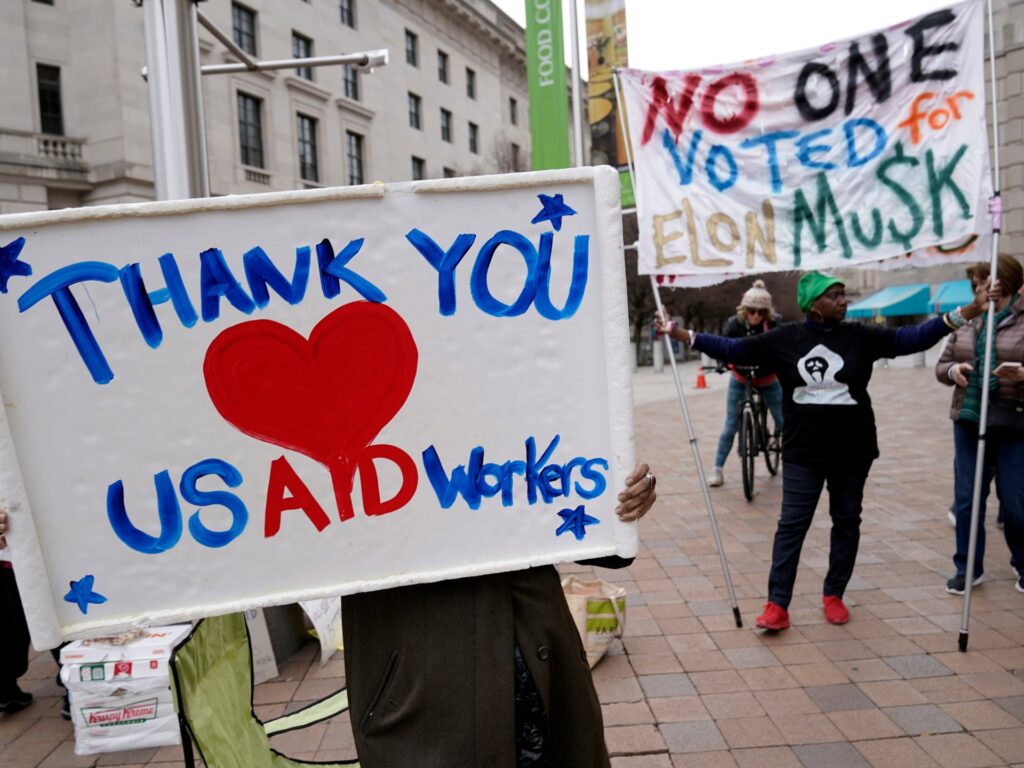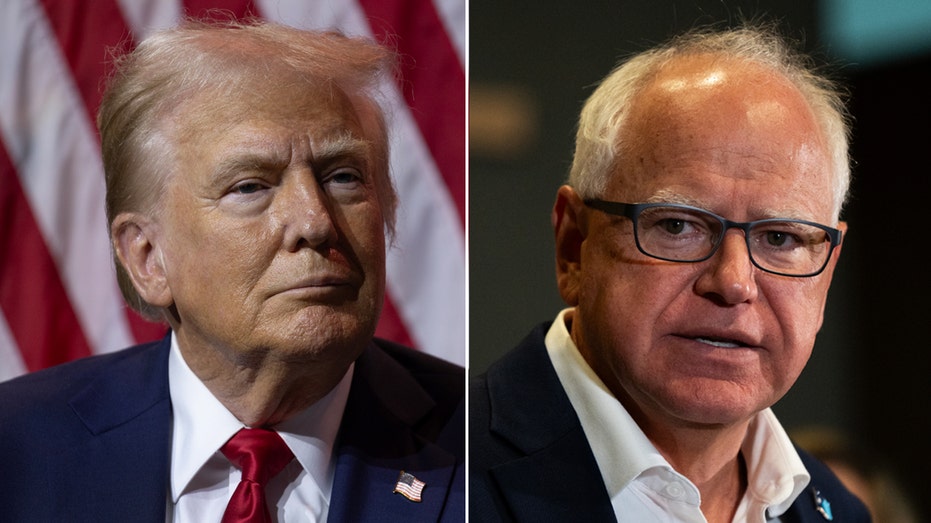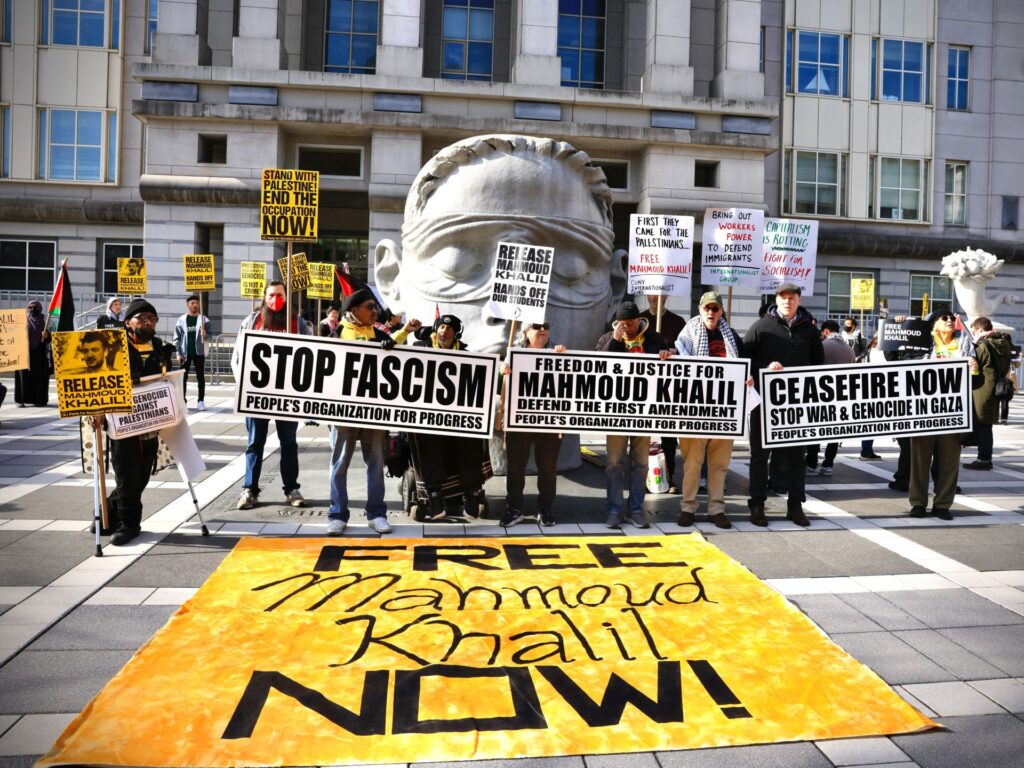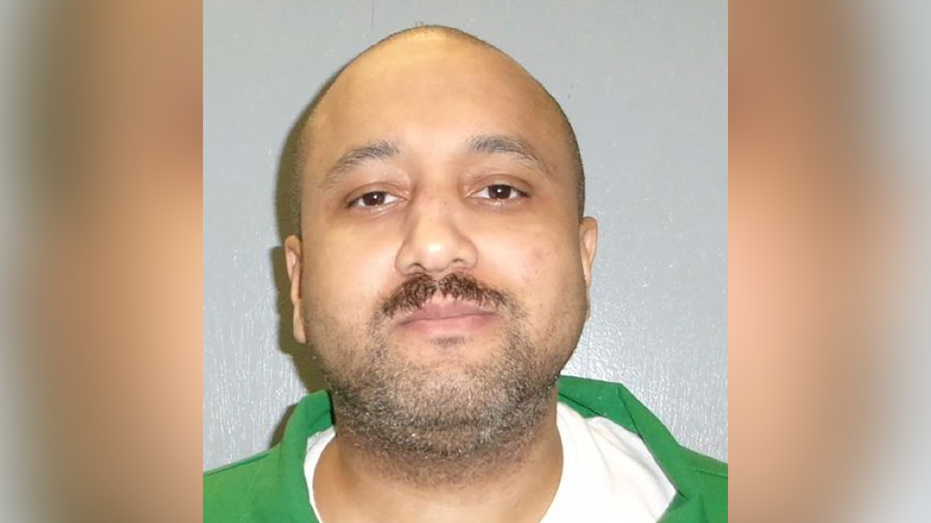‘Denmark hasn’t done a good job’ says US VP during Greenland trip
[unable to retrieve full-text content] US Vice President JD Vance addressed US troops after he landed in Greenland, accusing Denmark for not doing a ‘good job’
Trump administration seeks Congress approval for USAID reorganisation

The administration of President Donald Trump has made a formal request to Congress to reorganise the United States Agency for International Development (USAID), as the Republican leader faces constitutional challenges over his dismantling of the agency so far. USAID was set up under an act of Congress. But on Friday, Secretary of State Marco Rubio issued a notification signalling that the Trump administration would fold the agency’s independent functions into the Department of State under executive control. “We are reorienting our foreign assistance programs to align directly with what is best for the United States and our citizens,” Rubio said in a statement on social media. “We are continuing essential lifesaving programs and making strategic investments that strengthen our partners and our own country.” But critics have accused the Trump administration of exceeding its executive authority — and seeking to undermine independent agencies that do not align with its priorities. State Department spokesperson Tammy Bruce addressed the matter at a news briefing later in the day. Advertisement She said department officials “have notified Congress on their intent to undertake a reorganisation that would involve realigning certain USAID functions to the department by July 1, 2025, and discontinuing the remaining USAID functions that do not align with administrative priorities”. Bruce also denied that the dismantling of USAID would affect the country’s ability to respond to international disasters like Friday’s earthquakes in Myanmar and Thailand. “ We are ready to move now. So there has been no impact on our ability to perform those duties, those requests for aid if and when they come in,” she said. USAID was established under Congress’s authority through the Foreign Assistance Act of 1961. But it does operate under the secretary of state. Until the start of Trump’s second term as president, the agency was one of the largest distributors of foreign aid in the world — but that activity largely stopped when the president implemented a freeze on foreign assistance. In 2023 alone, the US distributed approximately $72bn in foreign aid. USAID was responsible for distributing about half of that sum. But Rubio has since announced on social media that 83 percent of USAID’s contracts have been cancelled. Further employee cuts at USAID The agency has also suffered massive layoffs, a trend that continued on Friday. US media obtained an internal memorandum to USAID employees warning that all positions — save those required by law — would be eliminated. Bruce, the State Department spokesperson, asked about the scope of those changes during her briefing. Advertisement “With any major change, there’s going to be disruption,” she said, adding that the layoffs were not unexpected. “We’ve been waiting for this conclusion. It has arrived. I can’t speak to the number of people who will not be a foreign service officer at this point. I can’t say if it’s going to be every single one.” “ It’s a restructuring essentially,” she continued. “Like any restructuring, there will inevitably be disruptions from Secretary Rubio down. We are committed to ensuring that USAID personnel remain safe and that the agency’s ongoing lifesaving aid programmes remain both intact and operational.” Bruce tied the layoffs to the Trump administration’s campaign to eliminate alleged “waste and fraud and abuse”, a project led by adviser and billionaire businessman Elon Musk. Already, in February, USAID saw large-scale cuts to its workforce. About 1,600 people were laid off, and all but a handful of the remaining staff were placed on leave, including those stationed abroad. Its headquarters in Washington, DC, was also shuttered, and workers were given 15-minute time slots to enter the building and quickly collect their belongings. Earlier this month, a federal judge issued a ruling that Musk and his Department of Government Efficiency (DOGE) “likely violated the United States Constitution in multiple ways” by dismantling USAID. Judge Theodore Chuang wrote that Musk and DOGE “deprived the public’s elected representatives in Congress of their constitutional authority to decide whether, when and how to close down an agency created by Congress”. Advertisement Through a temporary injunction, Chuang ordered DOGE and Musk to stop their efforts to cut USAID’s staff and contracts. But it is not clear whether that order applies to actions taken by the secretary of state. Musk has previously boasted that he was involved in “feeding USAID into the wood chipper”. Adblock test (Why?)
Tim Walz calls for ‘shadow government’ to counter Trump admin; son dunks on former veep nominee

Minnesota Gov. Tim Walz on Friday said a “shadow government” is needed to provide Americans with the truth about the Trump administration’s actions. Speaking at a town hall in Eau Claire, Wisconsin, Walz accused the Trump administration of attacking voting rights, which he argued could be remedied through a new form of government. TIM WALZ SAYS HE WAS JOKING WHEN HE MOCKED TESLA’S FALLING STOCK “We see one of the first things they do is try and restrict the vote,” Walz said of the Trump administration. “This is one of the things, though, that this is going to take power industry to — I don’t know what the answer is on this, but I’m kind of — I’ve been saying this: I think we need a shadow government, so when all these things come up every single day, we’ve got an alternate press conference telling the truth about what things are happening, tell them what’s going on.” The remark prompted criticism from Republicans. TIM WALZ CHEERS TESLA SOCK TUMBLE, BUT MINNESOTA STATE EMPLOYEES’ PENSION OWNS OVER 1M SHARES “Unhinged loser @Gov TimWalz wants to form a ‘shadow government’ in protest of requiring proof of citizenship for voter registration and banning foreign nationals from interfering in elections,” President Donald Trump’s social media team said on X. “Pls keep this up sir,” U.S. Rep. Nancy Mace, R-S.C., said. The term “shadow government,” mirrors a similar term used in the United Kingdom, where a component of the government creates a group of opposition leaders who mirror the actions of the cabinet in power. That group “shadows” the other cabinet by scrutinizing their actions and offering alternative solutions. In another part of his remarks, Walz admitted to getting dunked on by his 18-year-old son, Gus. “I was having one of those dad talks with him,” Walz said. “I was giving Gus my wisdom on what he had done wrong, you know, because I know these things, right, I’m a dad? And in the middle of it, he gives me the old, ‘Says the guy who got his a** kicked by Donald Trump.’” The Associated Press contributed to this report.
New report reveals how Trump admin will eliminate paper straws: ‘Not rocket science’

EXCLUSIVE: President Donald Trump’s executive order against paper straws that was signed in February is already beginning to “use all levers available” to cut back on them. Fox News Digital exclusively obtained a domestic policy council report outlining that the White House wants the Food and Drug Administration to look into the PFAS risk of paper straws and “consider restricting their use.” It is also pivoting away from using straws in federal government cafeterias, stopping the purchasing of them in federal contracts across a variety of agencies, and having the United States Department of Agriculture “not promote the development or manufacturing of paper straws in the future.” “Paper straws are a laughable supposition. They are bad for the environment, they are unhygienic, they are expensive, they contain dangerous forever chemicals, and—as with most things advanced by the previous Administration—they do not work,” the president wrote in a letter included in the report. SENATE CONFIRMS DR MARTY MAKARY AS TRUMP’S FDA CHIEF “This is not rocket science—water and other drinks dissolve paper, rendering these straws useless for their sole purpose. A product of a fictitious yet frequently cited statistic, they are inefficient and wasteful. It is ludicrous that anyone saw fit to enforce their use and that these useless implements have infiltrated our marketplaces as much as they have. Among the many things that my Administration is having to roll back, this is among the most absurd,” Trump continued. The Executive Order came just months after the Biden administration announced plans in July to phase out single-use plastic in the federal government. HHS AXES MORE THAN $300M IN GENDER, DEI-RELATED HEALTH GRANTS TO CALIFORNIA ALONE “The Trump Administration has undone this weaponization of government and will use all available levers to bring back common sense, end the use of paper straws, and restore functional utensils for the American people,” the report’s conclusion states, arguing not only that research does not back up the widespread use of paper straws, but also that it may “pose safety risks to children and people with disabilities.” Blue states such as California and New York currently have laws in place limiting the use of single-use plastic straws in full-service restaurants, unless customers request them. ‘BACK TO PLASTIC!’: TRUMP VOWS EXECUTIVE ORDER ENDING ‘RIDICULOUS’ PUSH FOR PAPER STRAWS Democratic states have also touted the use of paper straws as a more environmentally friendly alternative. Trump has criticized them for years, writing in a 2019 social media post that “liberal paper straws don’t work.” Fox News’ Aubrie Spady contributed to this report.
Statute of limitations for pandemic unemployment fraud expires; bipartisan coalition seeks extension

Federal law enforcement’s hands are tied now that the statute of limitations for prosecuting fraud in COVID-era unemployment programs has expired. While Congress extended the statute of limitations for pandemic-era business relief fraud in 2022, the window to prosecute fraud in individual relief programs closed Thursday. “There’s huge amounts of fraud that law enforcement officials are still trying to track down,” said Andrew Moylan, a public finance policy expert at the for-profit philanthropy group Arnold Ventures. “Every day that goes by from today, we lose the ability to prosecute fraud day by day. That’s a huge problem, and this should be something that’s an easy fix for Congress.” HUSBAND OF FORMER ‘SQUAD’ REP. CORI BUSH CHARGED WITH WIRE FRAUD LINKED TO RELIEF FUNDS: DOJ Despite opposition from 127 House Democrats, including Minority Leader Hakeem Jeffries, the House passed a bipartisan bill earlier this month to extend the statute of limitations for pandemic unemployment fraud from five to 10 years. The move mirrored what lawmakers did for the Paycheck Protection Program and the Economic Injury and Disaster Loans program in 2022. However, the Senate has yet to take up a companion bill needed to cement the extension, leading House lawmakers to call on their colleagues on Capitol Hill to make it a priority. “We can’t afford to let these fraudsters get away with the largest heist of tax dollars in American history,” Rep. Jason Smith, R-Mo., chairman of the House Ways & Means Committee, said Wednesday. “Not only do we have an obligation to taxpayers to recover as much of this money as possible — up to $135 billion — we also need to send a message that we will never falter in going after criminals who take advantage of our support for those in need. … There is no time to waste.” ‘DOGE’ SENATOR SEEKS TO ENSURE FEDS CAN CONTINUE PURSUING COVID FRAUDSTERS, DEBTORS, AS IG SOUNDS ALARM According to estimates from the Government Accountability Office, as much as $135 billion in pandemic unemployment insurance programs was lost to fraud during the pandemic. So far, only $5 billion, or less than 4%, has been recovered. Between the Department of Justice and the Department of Labor, there are more than 2,500 uncharged criminal matters or ongoing field investigations related to COVID-era criminal unemployment fraud, according to a fact sheet released by Smith. Unless the statute of limitations is extended by Congress, federal law enforcement will be unable to prosecute these cases. Moylan noted the majority of unemployment fraud during COVID stemmed from “loopholes” so big “you could drive a truck through” them in the Pandemic Unemployment Assistance program. THIS LEVEL OF FRAUD CAN ONLY EXIST WHEN GOVERNMENT IS WASTING THAT MUCH MONEY, SAYS VIVEK RAMASWAMY “They didn’t have strict enough paperwork requirements, and, so, basically anybody could apply for it and just attest that they were engaged in self-employed activity … and claim significant amounts of unemployment benefits in the process,” Moylan said. He also pointed out how people were applying for financial assistance under the names of dead people or prison inmates. “In California, about a billion dollars worth of fraud was facilitated by making claims on behalf of prisoners in prisons in California,” he said. This month, GOP lawmakers, including Smith, called on their Senate colleagues to take up the House’s legislation to extend the statute of limitations related to pandemic unemployment fraud. CLICK HERE TO GET THE FOX NEWS APP When asked why he thought the Senate had not yet taken up a bill to extend the statute of limitations for pandemic unemployment fraud, Moylan posited that it was “an attention span thing.” “This hasn’t been top of mind the way that nominations have been in the first part of the year for the Senate, or budget resolution, or now tax conversations, or, you know, whatever the scandal of the day may be,” Moylan said. “Those are the things that seem to dominate proceedings in the Senate. We now are in a situation where, if they don’t act soon, we’re going to lose the ability to prosecute more fraud in this program.”
Osasuna file appeal over Barcelona fielding Inigo Martinez in LaLiga match

Martinez was absent from Spain’s internationals, leading Osasuna to insist he should have sat out LaLiga encounter. Osasuna have filed an appeal with the Spanish football federation (RFEF) stating Barcelona should not have fielded defender Inigo Martinez in their LaLiga game over a technicality, as he sat out Spain’s matches with an injury. Martinez, who withdrew from the Spain squad for their Nations League games due to a swollen right knee, played the full 90 minutes in Barcelona’s 3-0 win on Thursday, which moved the league leaders three points clear in LaLiga. “The club understands that the participation of Inigo Martinez in yesterday’s match violated article 5 of Annex I of the FIFA Regulations on the Status and Transfer of Players,” Osasuna said in a statement on Friday. “[It] specifies that a player who does not join or leaves his national team for medical reasons may not play matches for his club during the five calendar days following the end of the international period. “Osasuna believes that Inigo Martinez, whose absence from the Spanish national team was due to a medical leave, was not eligible to play in yesterday’s match in accordance with FIFA regulations.” Inigo Martinez of Barcelona passes the ball whilst under pressure from Raul Garcia of Osasuna during the LaLiga match on Thursday [Clive Brunskill/Getty Images] The result left Osasuna 14th in the standings, six points clear of the safety zone. Advertisement Barcelona were originally meant to play Osasuna on March 8, but the death of the Barca club doctor forced the game to be rescheduled to March 27, just four days after Spain’s match, because there was no other date available. Both clubs had appeals for the fixture to be postponed rejected, with Barca unable to field some of their players, including one of their top scorers, Raphinha, who had just returned from international duty. Adblock test (Why?)
Trump says Greenland takeover needed for ‘world peace’

US President Donald Trump says the United States needs to take over Greenland for “world peace,” as he doubled down on his ambitions to annex the strategically placed, resource-rich Danish territory. “We are not talking about peace for the United States. We are talking about world peace. We are talking about international security,” Trump told reporters at the White House. Vice President JD Vance, his wife and other senior US officials visited an American military base in Greenland on Friday in a trip that was scaled back after an uproar among Greenlanders and Danes who were irked that the original itinerary was planned without consulting them. Soon after arriving, Vance briefly addressed US troops stationed at the base as he and his wife sat down to lunch with them, saying that he’s “really interested in Arctic security” and that if the US did not take the lead in the region powers like China and Russia would. “Our argument is not with the people of Greenland, who I think are incredible and have an incredible opportunity here. Our argument really is with the leadership of Denmark, which has underinvested in Greenland and has underinvested in its security architecture,” said Vance, who was also scheduled to receive briefings from military officials. “That simply must change. It is the policy of the United States that that will change.” Advertisement The revised trip to the semi-autonomous Danish territory comes as relations between the US and the Nordic country have soured after Trump repeatedly suggested that the United States should, in some form, control the mineral-rich territory controlled by Denmark – a traditional US ally and NATO member. Friday’s one-day visit to the US Space Force outpost at Pituffik, on the northwest coast of Greenland, removed the risk of potentially violating diplomatic custom by sending a delegation to another country without an official invitation. It also reduced the likelihood of Vance and his wife crossing paths with residents angered by Trump’s announcements. His delegation included the national security adviser, Mike Waltz, and Energy Secretary Chris Wright, as well as second lady Usha Vance. Al Jazeera correspondent Rory Challands says that Vance’s message was meant to coax residents of the island away from Denmark by suggesting that a partnership with the US would have more to offer. “I think what Vance was trying to do was very clear. His strategy was obvious: he’s trying to drive a wedge between Greenland and Denmark,” Challands reported from Nuuk, Greenland. “He was very, very critical of the Danes, basically saying that they had neglected the security of Greenland.” ‘We must stick together’ Before Vance’s arrival, four of the five parties elected to Greenland’s parliament earlier this month signed an agreement to form a new, broad-based coalition government. The parties banded together in the face of Trump’s designs on the territory. Advertisement “It is a time when we as a population are under pressure,” the prime minister-designate, Jens-Frederik Nielsen, said before the accord was signed to applause and cheers in the capital, Nuuk. He added that “we must stick together. Together we are strongest,” Greenland broadcaster KNR reported. In a post on Instagram, Danish Prime Minister Mette Frederiksen congratulated Nielsen and his incoming government, and said that “I look forward to close cooperation in an unnecessarily conflict-filled time.” Frederiksen said on Tuesday that the US visit, which was originally set for three days, created “unacceptable pressure”. She has said that Denmark wants to work with the US on defense and security, but Greenland belongs to the Greenlanders. Initially, Usha Vance had announced a solo trip to the Avannaata Qimussersu dogsled race in Sisimiut. Her husband then subsequently said he would join her on that trip, only to change that itinerary again – after protests from Greenland and Denmark – to a one-day visit by the couple to the military post only. Nonetheless, in an interview on Wednesday, Trump repeated his desire for US control of Greenland. Asked if the people there were “eager” to become US citizens, Trump said he didn’t know “but I think we have to do it, and we have to convince them.” ‘A bit crazy’ Inhabitants of Nuuk, which is about 1,500km (930 miles) south of Pituffik, voiced concern about Vance’s visit and the US interest in their island. Cora Hoy, 22, said Vance was “welcome if he wants to see it, but of course, Greenland is not for sale.” She added that “it’s not normal around here” with all the attention Greenland is getting. “I feel now every day is about [Trump] and I just want to get away from it.” Advertisement “It’s all a bit crazy. Of course, the population here is a bit shook up,” said 30-year-old Inuk Kristensen. “My opinion is the same as everyone’s: Of course, you don’t do things this way. You don’t just come here and say that you want to buy the place.” As the nautical gateway to the Arctic and North Atlantic approaches to North America, Greenland has broader strategic value as both China and Russia seek access to its waterways and natural resources. During his first term, Trump floated the idea of buying the world’s largest island, even as Denmark insisted it was not for sale. The people of Greenland also have firmly rejected Trump’s plans. Vance has several times criticised longstanding European allies for relying on military support from the United States, openly antagonising partners in ways that have generated concerns about the reliability of the US. Adblock test (Why?)
Judge in Mahmoud Khalil deportation case delays decision on release

NewsFeed A federal judge in the US state of New Jersey declined to decide whether pro-Palestinian student Mahmoud Khalil should be released on bail and instead will continue to consider whether the case should be transferred to Louisiana. Published On 28 Mar 202528 Mar 2025 Adblock test (Why?)
Fox News Politics Newsletter: South Carolina Firing Squad

Welcome to the Fox News Politics newsletter, with the latest updates on the Trump administration, Capitol Hill and more Fox News politics content. Here’s what’s happening… -State Department will absorb remaining USAID programming as independent agency is dismantled -Trump administration asks Supreme Court to review El Salvador deportation flight case -Vance’s ‘America First’ approach goes global, takes hardline message to Greenland A second South Carolina death row inmate has chosen execution by firing squad. Mikal Mahdi, 41, will be put to death on April 11 after pleading guilty to murder for killing a police officer in 2004. “Faced with barbaric and inhumane choices, Mikal Mahdi has chosen the lesser of three evils,” one of his lawyers, David Weiss, said in a statement. “Mikal chose the firing squad instead of being burned and mutilated in the electric chair, or suffering a lingering death on the lethal injection gurney.”…Read more ‘WE AGREE ON MANY THINGS’: Trump holds ‘extremely productive call’ with Canadian prime minister ‘DUMB AND DANGEROUS’: Hillary Clinton blasts Trump administration ‘stupidity’ in blistering NY Times essay ICE COLD DIPLOMACY: US accuses Denmark of treating Greenlanders as ‘second-class citizens’ during Vance visit to Arctic base VLAD AIN’T MAD: Putin says Trump plans for Greenland ‘has nothing to do’ with Russia TO THE FRONT: House Judiciary calls on Biden DOJ prosecutor to testify in Dr. Eithan Haim case CORRALLING THE COURTS: Josh Hawley believes his bill can stop ‘resistance’ judges from ‘provoking a crisis’ IT’S A ‘SNAP’: RFK Jr. backs WV push for SNAP waivers, work mandates under ‘MAHA’ ‘ACTIVIST JUDGE’: Two trans inmates ordered back to women’s prisons in Reagan-appointed judge’s injunction TRANS DAY OF VISIBILITY:Trans activists set ‘survival skills’ focus amid Trump’s executive orders for Trans Day of Visibility weekend ‘ONLY PRIORITY’: HUD chief puts illegal aliens living in govt-funded housing on notice: Americans are ‘our only priority’ ‘UNPRECEDENTED’: IRS sharing info with ICE would put illegal immigrants between ‘rock and a hard place’: expert ‘YOU BREAK HIS NECK’: Dem candidate caught on camera applauding notorious antisemite’s violent rhetoric: ‘You break his neck’ CAMPAIGN KICKOFF: Trump ally Donalds kicking off campaign in race to succeed Florida Gov. DeSantis PARTY ON FIRE: Democratic Party insiders dismayed after DNC meeting goes off the rails in ‘Titanic’- style anti-Trump forum GOLDEN TICKET: Newsom-backed San Francisco speed camera program fines certain drivers more than others Get the latest updates on the Trump administration and Congress, exclusive interviews and more on FoxNews.com.
Trump admin’s first oil and gas-lease sales nets nearly $40 million for U.S. coffers

The Interior Department announced Thursday that in the first three months of 2025, the federal government brought in nearly $40 million in revenue from oil and gas lease sales on public land. The development proves the worth of President Donald Trump’s vision to unleash American energy dominance, a top official said. “This quarter’s lease sales demonstrate Interior’s unwavering commitment to fostering American Energy Dominance, and we are grateful to those who produce energy on federal lands,” Interior Secretary Doug Burgum said in a statement. “By building on the commonsense, pro-growth policies of the Trump administration, we’re ensuring public lands are being used to their fullest potential to support national security, economic strength and livelihood of the American people.” AZ SENATE LEADER URGES BURGUM TO END BIDEN-OBAMA LAND GRABS OF URANIUM SITES The Bureau of Land Management (BLM), which falls under Burgum’s auspices, leased 34 land parcels for fossil fuel development since January. Those 25,038 acres brought in $39,007,609 in total receipts. The revenues will be divided between the feds and each particular state where the leases were sold. RFK JR BACKS WV PUSH FOR SNAP WAIVERS, WORK MANDATES UNDER ‘MAHA’ States receiving the windfalls include Montana, North Dakota, New Mexico, Wyoming and Nevada. The Interior Department said in a statement that the sales were in concert with Trump’s Executive Order 14154: “Unleashing American Energy.” The department assured that the various parcels will be developed in alignment with the National Environmental Policy Act of 1969 – an environmental quality and impact law spearheaded by former Sen. Scoop Jackson, D-Wash. CLICK HERE TO GET THE FOX NEWS APP The leases have a one-decade lifespan and “as long thereafter as there is production of oil and gas in paying quantities.” The feds will are also entitled to a 16.67% royalty.

